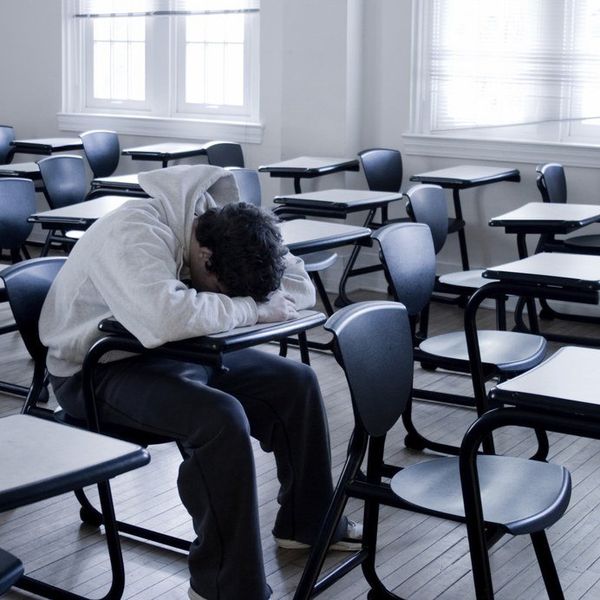As the holiday season approaches quickly, many college students in the United States prepare for a busy period of studying for final exams, juggling relationships and going home to see family members they haven’t seen in quite some time. For some college students, however, this extreme stress, not to mention the colder fall and winter seasons, can allow for symptoms of situational or untreated clinical depression and anxiety to come to the surface. Symptoms such as feeling anxious, fatigued, oversleeping, insomnia, a change in appetite or irritability are often associated with long nights of studying or seen as unfortunate side effects of procrastination. Once the stress of finals is over, however, these symptoms may persist as many often find themselves with a new set of stressors when they return home. These stressors, such as re-entering an unfamiliar familial structure that has reorganized without them, or simply having a large amount of free time on their hands that allows a person to finally focus on feelings of hopelessness, may in fact exacerbate the symptoms of depression and anxiety. For 21 year old Sadiedrah Harris, a senior at Fayetteville State University, she found that after a bad breakup and having to deal with the stresses of school and work, she began to isolate herself as her feelings of anxiety became unbearable. It wasn't until a friend noticed that she was acting differently and finally intervened that she finally decided to get help for her depression and anxiety. "She told me that i should go talk to someone and she called the Center for Personal Development for me and I went and talked to someone." Sadiedrah said. "It saved my life."
While it is important to note that mental health affects students of all ethnicities, races, genders and sexual orientations, some students are more at risk than others when it comes to facing a lack of treatment for such issues. The chances of a student’s depression and anxiety going untreated during these stressful times go up if a student is a racial or ethnic minority, as studies show minority students are far less likely to seek help when dealing with mental illnesses compared to their non-Hispanic white counterparts. If one considers that women are two times more likely than men to be diagnosed with depression and anxiety, this means that female students of color quite often suffer the most from a lack of treatment from such mental health issues in university settings. The rate of lack of treatment only increases if one is LGBT. Sadiedrah, an African-American woman, felt that her gender would be held against her if she sought help. "I felt that if i told someone they would be like 'Oh you're just overreacting to what's happening.' I felt like everything would be blamed on the fact that I was a woman in my 20’s and I was just going through what everyone my age was going through." While Sadiedrah felt that her race didn't play a role in how she viewed mental illness, she does acknowledge that she felt getting help for her depression and anxiety meant she was weak, a stigma unfortunately held by many minorities when dealing with mental health issues.
According to a study from Vanderbilt University, research shows that minority students, especially students from African-American communities, are more likely to push themselves academically to the point of extreme illness in order to combat stereotypes of intellectual inferiority, an idea known as John Henryism, coined after the tale of a slave named John Henry who worked himself to death in order to prove he was capable. Not only are students of color more likely to push themselves harder, they often deal with outside stressors non-Hispanic whites do not deal with on a daily basis, such as racism and discrimination, adding to the already stressed mind of a college student. Unfortunately, stigmas of mental illness, as well as an overall lack of communication about the subject, have also caused many students within minority communities to suffer with depression and anxiety in silence. "Growing up. It was never something people talked about in school and the different friends I had." Sadiedrah stated. "Until I found out that one of my brothers had suffered from a mental illness and then I became diagnosed with moderate to severe depression and anxiety was when it became real to me. I knew something was wrong with me, I just never thought that talking to someone would actually help me and realize what was wrong with me."
According to a study by the Asian American Center on Disparities Research at the University of California Davis, only an estimated 28% of Asian Americans suffering from mental illness will ever seek treatment due to the negative stigma and shame that could not only be attached to themselves, but their families. Students within the Latinx and African-American communities often grow up with a stigma placed on mental health issues, many perceiving it as a personal weakness as Sadiedrah did, and will be more likely to turn to religion or family for help instead of a mental health professional. This is all while an estimated 16.3% of Latinx adults and 18.6% of African American adults in America live with depression and anxiety. The minority students who could perhaps suffer the most are American Indian and Alaskan Native students, who often experience depression and anxiety at rates 1.5% greater than any other racial group in America. Due to an overall lack of awareness of mental illness in many Native American communities, many students who are Native American or Alaskan Natives may not seek help for mental illnesses that could surface during stressful periods in universities. These disparities in mental health care for minority students only stresses the importance of universities embracing a multicultural approach to healthcare. Universities should work to break through the stigmatization of treatment for mental illnesses through education and work to ensure their healthcare facilities are welcoming to all races, ethnicities, genders and sexual orientations.
When asked if she felt there were enough resources for treatment of mental health problems on her college campus, Ms. Harris was sure there was more that could be done. "Mental health is something that is not talked about on campus. I had to google the symptoms I had because I felt like there was no one to talk to about it." Due to this lack of communication about mental health treatment for minority students during this holiday season, it is important that minority students also take control of their health, just as Sadiedrah did, and learn the symptoms of depression and anxiety. It is also important that they discover what their university and insurance coverage offers to them in terms of mental health care so that they may begin their journey to well being. There is a difference between simply feeling stressed and clinical depression and anxiety, however, so having one symptom of depression or anxiety does not necessarily mean you have these illnesses. If you are unsure, it is best to seek out professional advice. While it may seem like a waste of time to many, know that those who suffer with an untreated mental illness may only get worse, which can contribute to a host of health problems and lead to high risk, dangerous behaviors such as binge drinking, substance abuse and unprotected sex, all of which could not only damage your health but your overall college experience.
Depression and anxiety are manageable, but are much easier to treat when caught early. If you are found to have depression or anxiety, your doctor may prescribe medication or psychotherapy to help you, and will do everything they can to personalize your treatment until it works for you. Finally, if you feel that you are suffering from depression and anxiety and fear that you may hurt yourself in any way, please reach out and know that you are not alone. The National Institute of Mental Health advises that if you feel suicidal or feel like a danger to yourself that you call campus security or 911 immediately, call a helpline, such as 1-800-273-TALK (8255), for free 24-hour help, or call a friend to take you to the emergency room where you will receive the help you need.
If you simply feel overwhelmed by the stress of college and want to start healthy habits to benefit your mental health, there are ways to alleviate these feelings and manage stress to keep yourself healthy. The National Institute of Mental Health advises that keeping the body well fed and rested, as well as keeping to a regular exercise routine may help one to manage stress. Try to keep organized and make lists that allow you to break down tasks. This will keep you from feeling overwhelmed by all that still needs to be done. Lastly, remember to get out every now and again to have fun with your friends and family. Try not to use alcohol or other substances to relieve stress, as this may have an affect opposite of what you intended, as it may in fact elevate stress in the long term.
If there's one thing Sadiedrah wants other minority college students to know about seeking help for depression and anxiety, it's that they have to be open to change, not only in themselves, but changes in others. "When you are going through this you have to have an open mind and heart and that's one thing I learned. Through this, it has taught me that you never know what someone is going through and even if that person does know, it doesn't give them a reason to be there for you."
If you are suffering from depression and anxiety, or even just overwhelming stress as a minority student, you are not alone. Those who recognize they need help are never weak and the sooner you seek help, the sooner you can overcome this obstacle and have a better quality of life as a college student. You are the strongest of all of us. Thank you Sadiedrah Harris for sharing your experience with the world, and helping to get the word out about depression and anxiety. Good luck on your finals and stay healthy! Happy holidays!





















